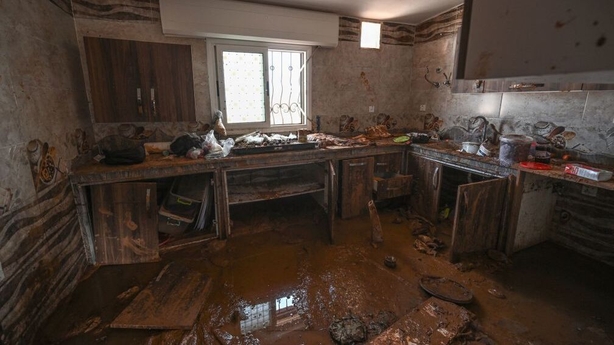Libya's prosecutor general has ordered the arrest of eight officials as part of his inquiry into the recent flood disaster that killed thousands of people.
The flash flood, which witnesses likened to a tsunami, broke through two ageing dams on 10 September after a hurricane-strength storm lashed the area around Derna, a port city in the country's east.
The officials are suspected of "bad management" and negligence, a statement from the prosecutor general's office said, adding that they served currently or previously in offices responsible for water resources and dam management.
On Saturday the official death toll passed 3,800. International aid groups have said that at least 10,000 may be missing.
After opening an inquiry, prosecutor general Al-Seddik al-Sur said earlier this month that the two dams upstream from Derna dad been cracked since 1998.
But repairs begun by a Turkish company in 2010 were suspended after a few months when Libya's 2011 revolution flared, and the work never resumed, the prosecutor said on 16 September, vowing to deal firmly with those responsible.
The 2011 NATO-backed revolt toppled longtime dictator Muammar Gaddafi, leading to more than a decade of start-stop conflict.
Libya is now divided between an internationally-recognised Tripoli-based administration in the west - to which Mr Sur belongs - and another in the flood-struck east.
Eastern forces years ago launched a failed assault on the capital that ended in a 2020 ceasefire.
Since then a period of relative stability has held and allowed the war-ravaged country to try to rebuild.

Abu Mansur was the first dam to collapse in the disaster, 13km from Derna, whose reservoir held 22.5 million cubic metres of water.
The deluge then broke Al Bilad, the second dam, which had a capacity of 1.5 million cubic metres and is just 1km from the coastal city.
The wall of water and debris swept through the normally dry riverbed that cuts through the city centre.
Both dams were constructed by a Yugoslav company in the 1970s, "not to collect water but to protect Derna from floods", Mr Sour said.
Since the 2011 revolution, a budget has been allocated every year to repair the two dams, but none of the successive governments has undertaken the work, according to an official.
In a 2021 report from the Libyan audit bureau, officials criticised "procrastination" on resuming repair work at the two dams.
Last November, engineer and academic Abdel Wanis Ashour warned in a study that a "catastrophe" threatened Derna if the authorities did not carry out maintenance on the dams.

